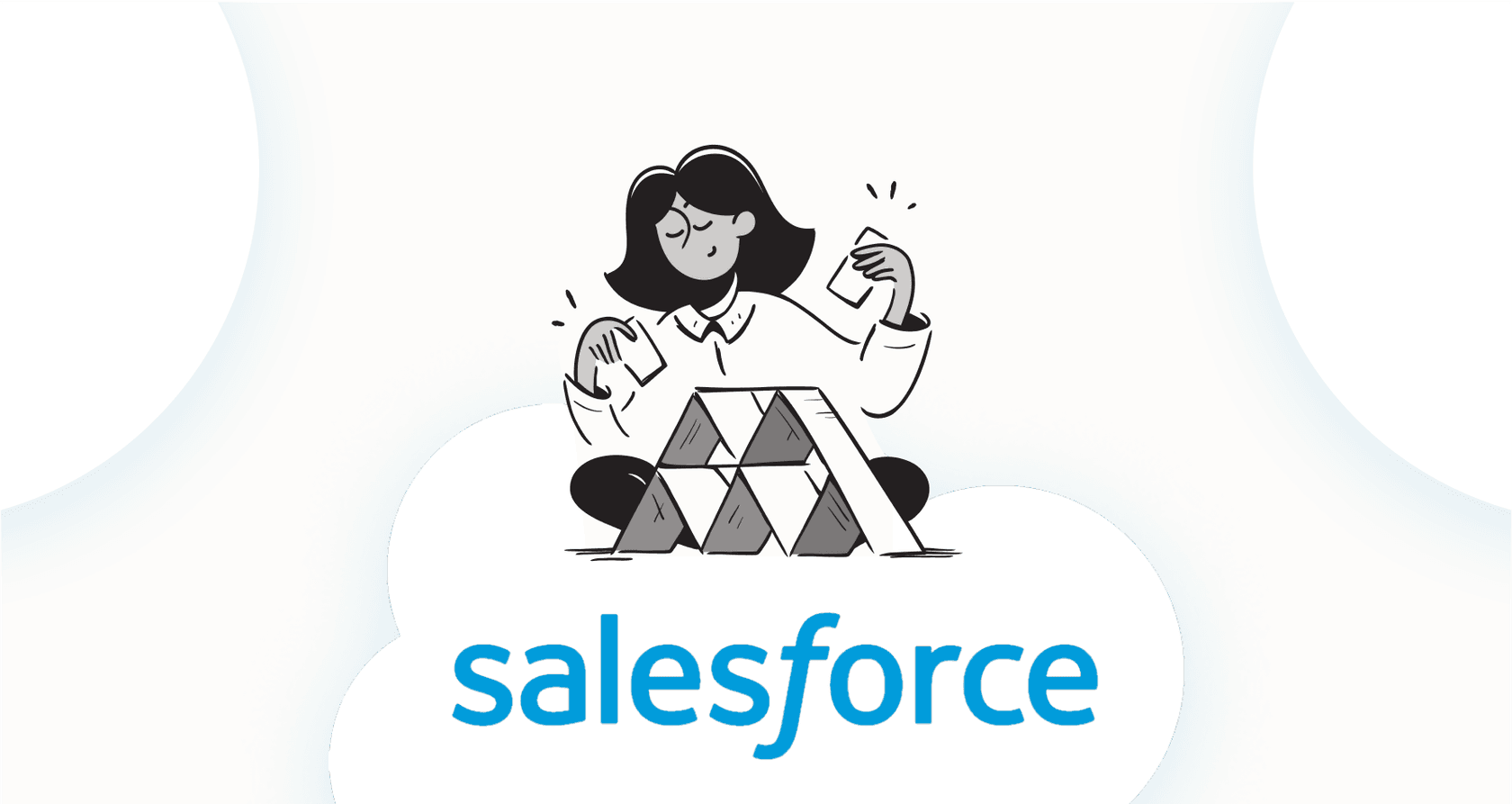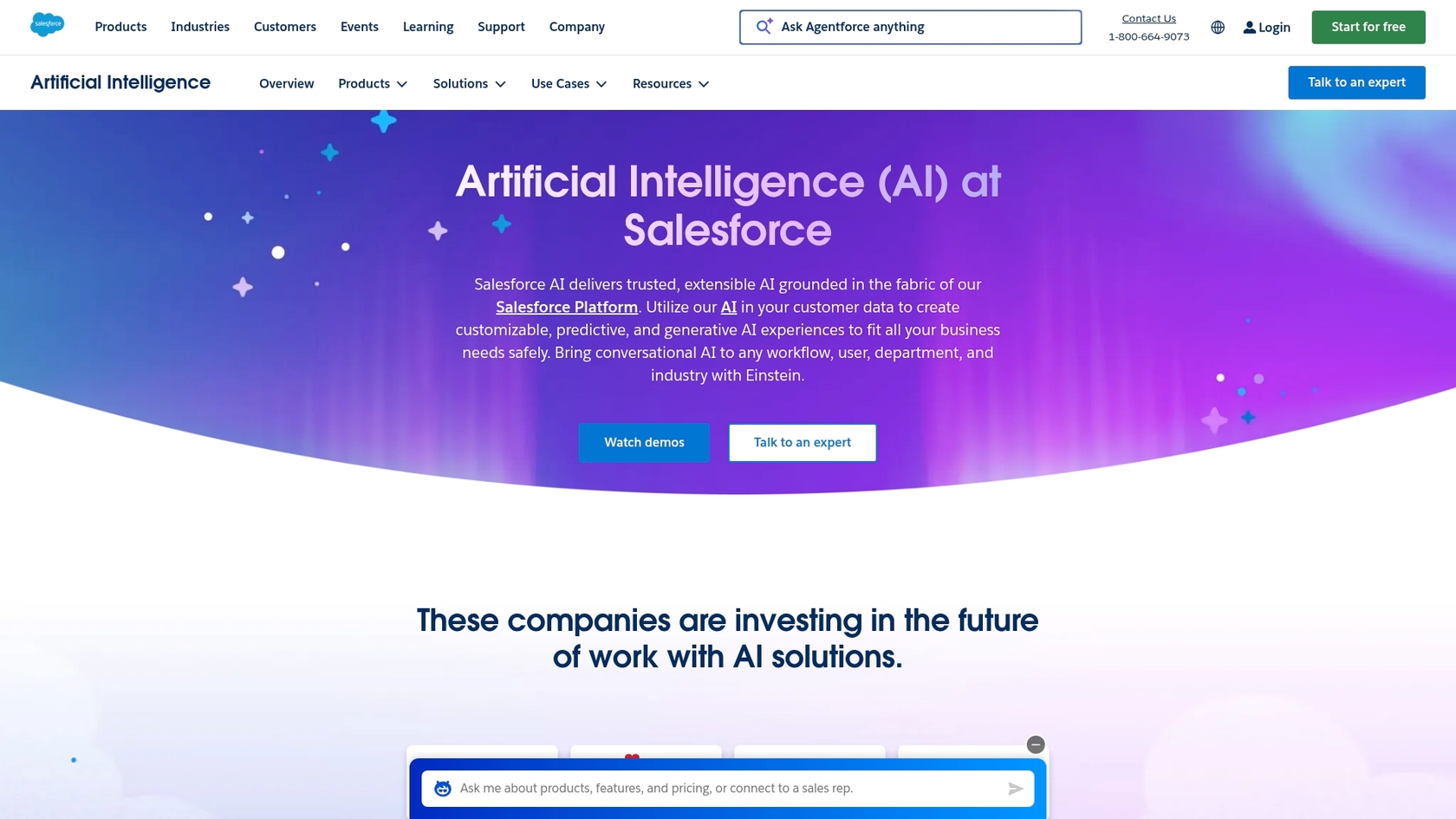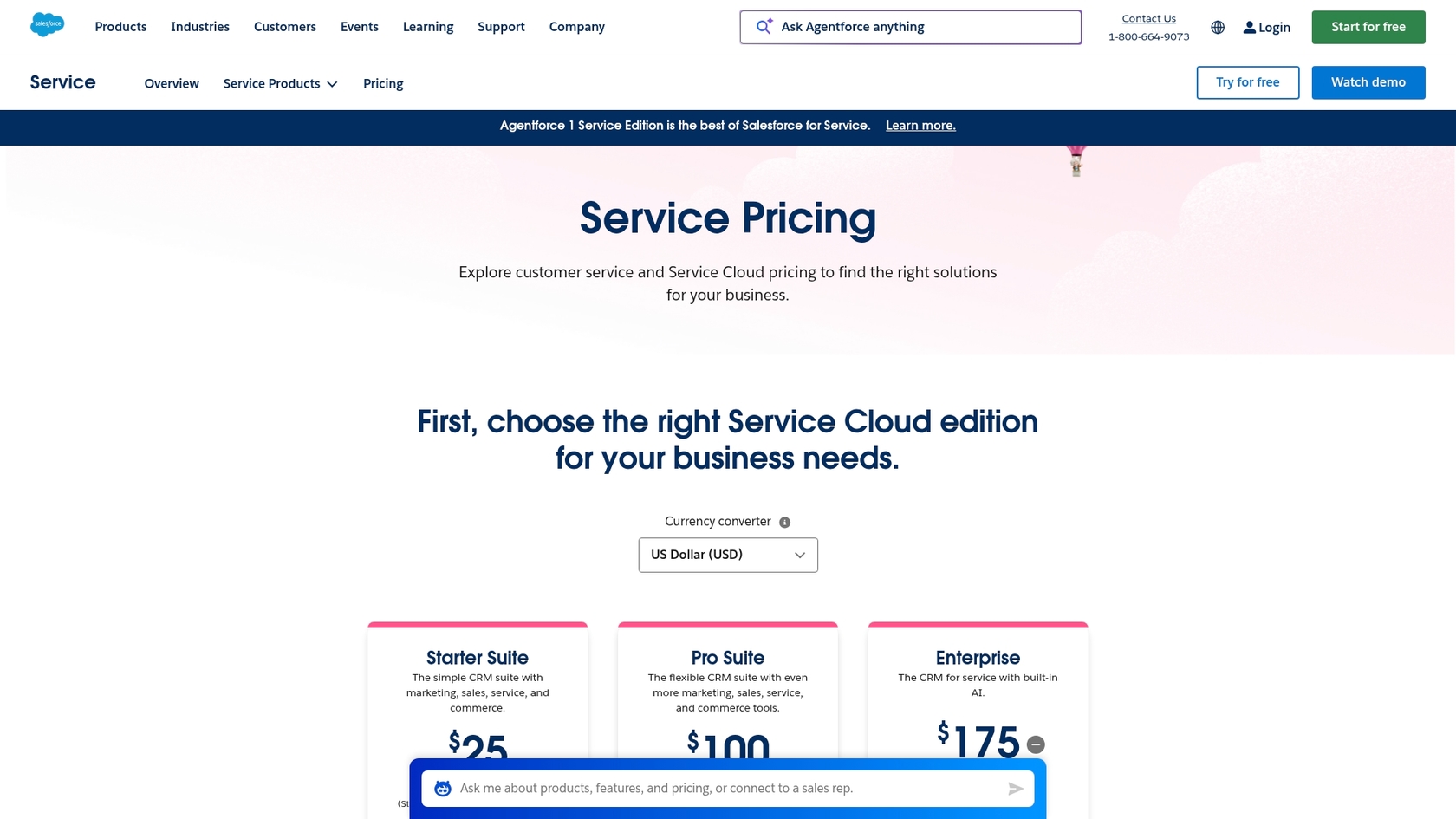
Let's be honest, Salesforce is a giant in the business software world. For many companies, it's the command center for all things customer-related. So when it comes time to pick a tool for support, their Service Cloud often feels like the default choice. But with so many nimble, AI-first tools popping up, it’s worth asking: is this massive, all-in-one platform really the best fit for your team?
This guide is here to cut through the marketing fluff and give you a realistic look at the Salesforce customer service platform. We'll walk through its main features, what its AI can (and can't) do, how the pricing works, and some of the real-world limitations you should be aware of. By the end, you should have a much clearer idea of whether it's the right tool for you, or if another path makes more sense.
What is the Salesforce customer service platform?
At its heart, the Salesforce customer service platform is really Salesforce Service Cloud. It's a customer service solution built right on top of the company's enormous CRM platform. It’s probably better to think of it as an entire ecosystem rather than a single tool, designed to cover everything from managing tickets to building out a help center.

To make things smarter, Salesforce has sprinkled in AI through its Salesforce Einstein and the more recent Agentforce products. The goal of these tools is to help automate repetitive tasks, give agents quick answers, and generally make your support team's life easier.
The big promise is a single, complete view of every customer. Since Service Cloud is tied so tightly to other products like Sales Cloud and Marketing Cloud, your support agents can theoretically see every single touchpoint a customer has had with your business. This deep integration is its greatest strength, but as we’ll see, it can also be a bit of a double-edged sword.
Core features and their limitations
Alright, let's get into the nitty-gritty of what Salesforce actually gives you and the trade-offs that come with it.
The Service Console: A unified but complex command center
The Service Console is where your agents will spend their days. It’s meant to be their mission control, pulling in data from every corner of the CRM to give them that coveted 360-degree view of the customer.
On paper, this sounds amazing. An agent gets a ticket and can instantly see a customer's entire history, past purchases, previous support issues, you name it. The problem is that the sheer amount of information and the endless configuration options can be seriously overwhelming. This is not a "sign up and go" kind of tool. Getting the console dialed in to be genuinely helpful usually means hiring a certified Salesforce administrator or an outside consultant, which adds a hefty, often unplanned, cost to the whole endeavor.
Case management and omnichannel routing
Service Cloud is designed to handle support requests (which Salesforce calls "cases") from pretty much anywhere, email, phone, social media, web chat. Its omnichannel routing system is built to automatically assign these cases to the best agent for the job based on things like skill set or current workload.
But here's where it can get complicated. While the system is undeniably powerful, setting up the rules can feel like you need a background in software engineering. A seemingly simple change to a workflow can send you down a rabbit hole of complex menus and rule engines. Plus, its effectiveness hinges entirely on how clean and organized your data is inside Salesforce. If you want to use information from outside knowledge sources to help route tickets, it's not exactly a straightforward process.
Knowledge management within Salesforce
Salesforce has its own built-in knowledge base feature, letting your team write, publish, and manage support articles. The AI can even suggest articles to agents to help them solve tickets faster.
This works pretty well, with one huge catch: the knowledge base is basically stuck inside the Salesforce universe. This is a massive headache for companies where the real expertise lives in other tools like Confluence, Google Docs, or Notion. You’re faced with two not-so-great options: either start a huge, painful project to move all your content into Salesforce, or try to keep two separate knowledge bases updated, which kind of defeats the whole purpose of having one source of truth.
This is a classic dilemma, and it's where a different approach, like the one eesel AI takes, comes into play. It doesn't ask you to move your entire knowledge library. Instead, it securely connects to all the places your team already works. It turns your scattered documents into one smart, searchable knowledge source that can give instant, accurate answers without any data migration.
Salesforce AI and automation: Powerful but demanding
Salesforce has poured a ton of money into AI, with its Einstein platform and new Agentforce products at the forefront. But turning all that potential into tangible results isn't always a walk in the park.
Einstein Bots and AI-powered recommendations
Einstein Bots are Salesforce’s take on chatbots. They’re meant to answer common customer questions and handle the simple, repetitive tickets so your agents don't have to. Behind the scenes, Einstein AI also drives features like automatically categorizing cases, recommending help articles, and suggesting the "next best action" for an agent.

The reality check? Training and maintaining these bots is a significant undertaking that relies on having exceptionally clean and well-structured data inside Salesforce. On top of that, these features are often expensive add-ons or are only included in the highest-priced plans. Getting them to work reliably for anything beyond the most basic queries can be a long and expensive journey.
The "Agentic Enterprise" vision
You might hear Salesforce talking a lot about its vision for an "Agentic Enterprise." This is a future where autonomous AI agents can handle complex, multi-step tasks across different departments.
It's an exciting idea, but it's important to see it for what it is right now: a long-term goal. For most companies, achieving this vision means going all-in on the entire Salesforce ecosystem, including their Data Cloud. It’s not something you can just switch on over a weekend and start seeing results.
This is where a tool like eesel AI offers a more grounded approach to automation that you can use today. You can get up and running in minutes, not months, because it's a completely self-serve platform. With a few clicks, you can connect your help desk and immediately simulate how an AI agent would have handled thousands of your past tickets. This no-risk simulation lets you see the potential return on investment and tweak the AI's performance before it ever interacts with a real customer. That’s a level of speed and confidence that’s tough to find with massive, all-in-one platforms.
Salesforce customer service platform pricing
Salesforce Service Cloud’s pricing is a classic per-user, per-month model, and you’ll almost always be signing an annual contract. One of the most important things to know is that many of the best features, particularly the AI ones, are locked away in the more expensive plans.
| Plan | Price (USD/user/month, billed annually) | Key Features |
|---|---|---|
| Starter Suite | $25 | Basic case management, knowledge base, customizable reports. |
| Pro Suite | $100 | Adds real-time chat, sales quoting, and more customization. |
| Enterprise | $175 | Adds built-in AI, self-service help center, and workflow automation. |
| Unlimited | $350 | Adds 24/7 support, chat, and bots. |
| Agentforce 1 Service | $550 | Full AI suite, unmetered Agentforce usage, Tableau, Data Cloud credits. |

When you look at these numbers, a couple of things probably jump out at you. First, the per-user cost can add up incredibly fast as your support team gets bigger. Second, the really useful AI and automation tools don't even show up until the Enterprise plan at $175 per user, per month. That's a pretty high barrier to entry if you just want to start automating support.
This model is a world away from eesel AI's transparent pricing. eesel AI doesn't charge you for every agent on your team. Instead, its plans are based on how many AI interactions you use, so you're paying for the actual value you get from the automation. There are no hidden fees per ticket resolved, and you can even start on a flexible monthly plan. It’s a much better fit for teams that want to prove the value of AI before locking into a big annual contract.
The Salesforce customer service platform verdict: A powerful ecosystem for the fully committed
So, what's the bottom line? The Salesforce customer service platform is an incredibly capable, data-rich solution for businesses that are already living and breathing Salesforce. If your whole company is built on the platform, it can be a logical, if pricey, choice.
But that power comes with a lot of complexity, a high total cost of ownership (especially when you add in admin and consultant fees), and a very rigid, "our way or the highway" approach to your knowledge and automation. For teams who want a flexible, top-tier AI solution that plays nicely with the tools and knowledge they already have, Salesforce can feel like using a sledgehammer to crack a nut.
A smarter, faster way to AI-powered support
What if you could get all the benefits of AI without having to buy into a massive, complex ecosystem? That’s where eesel AI offers a modern alternative. It’s built for teams that want to see results now, not after a six-month implementation project.
Here’s what makes eesel AI different:
-
Go live in minutes: It’s a truly self-serve platform. You can connect your existing help desk and knowledge sources like Zendesk, Confluence, Google Docs, and Slack with just a few clicks.
-
Unify your actual knowledge: It connects to dozens of tools, so your AI is always trained on your team's single source of truth, wherever it happens to be.
-
Roll out with confidence: You can use its powerful simulation mode to test the AI on thousands of historical tickets, ensuring everything works perfectly before you go live. You have total control.
-
Predictable costs: The pricing is based on AI usage, not how many agents you have. It’s fair, transparent, and easy to scale.
Instead of locking your team into a huge platform, why not see what a dedicated AI platform can do for you?
This video explains the core functionalities of Salesforce Service Cloud, the heart of the Salesforce customer service platform.
Explore how eesel AI can automate your support in minutes, not months.
Frequently asked questions
While powerful, the Salesforce customer service platform is generally not a "sign up and go" solution. Its complexity often requires significant setup time and potentially an administrator or consultant, making it less ideal for quick deployments by smaller teams without dedicated resources.
The Salesforce customer service platform uses a per-user, per-month pricing model, typically billed annually, with many advanced features locked into higher-tier plans. Beyond subscription fees, expect potential hidden costs for customization, administration, and external consultants to configure the platform effectively.
The Salesforce customer service platform includes AI through Einstein and Agentforce for bots and recommendations, but leveraging these requires exceptionally clean, well-structured data. Training and maintaining these AI features can be a significant undertaking and are often available only in more expensive plans.
Integrating external knowledge bases directly into the Salesforce customer service platform can be challenging, as its built-in knowledge management tends to keep content within its ecosystem. This often necessitates migrating existing content or maintaining separate knowledge sources, which isn't ideal for a unified source of truth.
The Salesforce customer service platform is most suitable for businesses already deeply invested in the broader Salesforce ecosystem, such as using Sales Cloud or Marketing Cloud. Its strength lies in deep integration across these platforms, providing a comprehensive solution for companies committed to the Salesforce environment.
Adopting the Salesforce customer service platform can present challenges such as high complexity in setup and customization, a significant total cost of ownership including consultant fees, and potential rigidity in integrating with non-Salesforce tools or knowledge sources. It requires a substantial commitment to the platform.
Share this post

Article by
Kenneth Pangan
Writer and marketer for over ten years, Kenneth Pangan splits his time between history, politics, and art with plenty of interruptions from his dogs demanding attention.






